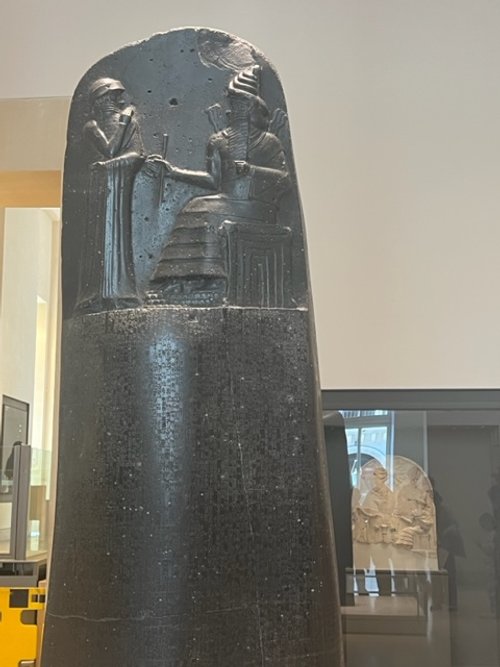The Code of Hammurabi
Last week, my husband took me on a trip to celebrate an upcoming milestone birthday, and I got the chance to visit the Louvre Museum in Paris. One of the most interesting things I saw was the Code of Hammurabi. It was amazing to see!
The Code is written on a tall, black stone pillar called a stele. The stele is over seven feet tall and has carvings that show King Hammurabi receiving the laws from the god of justice.
While the laws (and punishments!) are different than they were 3,500 years ago in ancient Babylon, humans then had to deal with the same issues that we deal with today. The code covers many topics, including criminal law, family law, and the laws of inheritance. Given that I'm an estate planning attorney, I wanted to know what the Code said about inheritance.
From Babylons to Beneficiaries
The Code of Hammurabi does not explicitly mention the concept of a will. However, it does state that a person's property will be distributed among their family members based on a set of rules, depending on whether or not the person had children.




Ancient Inheritance Laws
Here’s what the Code of Hammurabi states about inheritance:
If a man dies without children, his property will go to his wife
If he has no wife, it will go to his brothers
If he has no brothers, it will go to his father's brothers.
However, if a man dies with children, his property will be divided among them, with the oldest son receiving the most and the other sons receiving less.
If there are no sons, then the property will go to the daughters.
Inheritance laws today
In the United States today, common law governs inheritance in each state. Generally speaking, here is what the law today states about inheritance:
If someone dies without a will, their property will be distributed to their surviving spouse and children.
If there is no surviving spouse or children, the property will go to the deceased's parents, siblings, or other relatives.
While not exactly the same as the Code, our law today isn't that far from the laws of ancient times. Both the Code and our laws today recognize the importance of providing rules that help prevent disputes over inheritance.
One notable difference is that today’s legal system recognizes the importance of a person’s right to decide how their property is distributed after their death.
You have the right to choose.
The only way to ensure that your wishes are carried out and your property is distributed according to their wishes is to create an estate plan.
Sum It Up
The Code of Hammurabi may have been written over 3,500 years ago, but it still provides insight into the importance of inheritance and how societies have historically approached it.
It reminds us that while times may change, the importance of ensuring your legacy lives on does not.
Are you ready to take control?
Follow these steps to get the ball rolling in your court!
Download our Estate Planning Workbook to help you think through some of the questions you will be required to answer
Review our Estate Planning pricing plans to learn more about how we help you plan for your future.
Get started working with us when you are ready to take control of your legacy!



